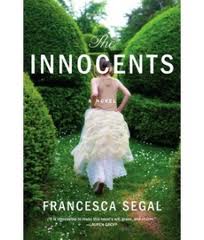Jewish Literary Links for Shabbat

Shabbat shalom!

Shabbat shalom!
 Just a couple of days ago I mentioned that I’ve been reading The Innocents, the debut novel by Francesca Segal. As I noted, Segal’s book updates Edith Wharton’s The Age of Innocence and transplants it to a tight-knit Jewish community in contemporary London.
Just a couple of days ago I mentioned that I’ve been reading The Innocents, the debut novel by Francesca Segal. As I noted, Segal’s book updates Edith Wharton’s The Age of Innocence and transplants it to a tight-knit Jewish community in contemporary London.
I picked up a complimentary pre-publication copy (and had it signed by the author) at last month’s Book Expo America here in New York City. I also had the good fortune to catch one of Segal’s tweets about a reading she was giving at a bookstore in my neighborhood that same week, so I had the chance to hear the book’s opening section read aloud with a suitably British accent.
But it took a few weeks until I managed to start reading the book myself. Once I began, it was tough to put the book down. I’m not at all certain that all other readers will be as captivated by both elements of the book–the adaptation of the Wharton tale and the depiction of a Jewish community and its customs–as I was. But they sure captivated me.
I’ll leave you with a sampling of brief excerpts–passages that I found so resonant that they inspired me to dog-ear their respective pages and return to think consider them more intensively. (more…)

Shabbat shalom!

Happy to share some pre-Shabbat literary links.
Shabbat shalom.
Confession: I frequently read, admire, and link to Israeli author Etgar Keret’s nonfiction/essays (particularly his columns for Tablet), but I haven’t always been as comfortable with Keret’s fiction. I read The Nimrod Flipout when its U.S. publisher sent me a review copy of the English translation several years back (2006), and although I understood what the fuss was about–Keret is one prodigiously talented, not to mention prolific writer–my own reading tastes just don’t hunger for the sheer strangeness–call it experimentalism, fabulism, magical realism, whatever–that seemed to characterize the collection.
 Moreover, back then–around the time of the Second Lebanon War–my nascent interest in attempting to understand contemporary Israel through its literature was intensifying. There was so much about Israel that I, a Diaspora Jew, needed to learn (this remains all too true six years later). Keret’s fables and flash fictions didn’t seem to engage with the seriousness of what the Israelis call hamatzav— “the situation,” namely, the pervasive conflict that suffuses life in their country. It occurred to me only hazily (if at all) that this was a selfish indulgence of my Diaspora self; living within “the situation,” Keret could certainly be excused from spending still more time with it in his fiction.
Moreover, back then–around the time of the Second Lebanon War–my nascent interest in attempting to understand contemporary Israel through its literature was intensifying. There was so much about Israel that I, a Diaspora Jew, needed to learn (this remains all too true six years later). Keret’s fables and flash fictions didn’t seem to engage with the seriousness of what the Israelis call hamatzav— “the situation,” namely, the pervasive conflict that suffuses life in their country. It occurred to me only hazily (if at all) that this was a selfish indulgence of my Diaspora self; living within “the situation,” Keret could certainly be excused from spending still more time with it in his fiction.
But last week, a review-essay on The Millions caught my eye. Titled “The Maturation of Etgar Keret” and written by Bezalel Stern, it captivated me. And it sent me hurrying to add two new volumes to my bookshelf: Suddenly, A Knock on the Door (Keret’s latest book to be released in English, with translations by Nathan Englander, Miriam Shlesinger, and Sondra Silverston) and Four Stories, a slim collection I’ll address in greater detail shortly. (more…)